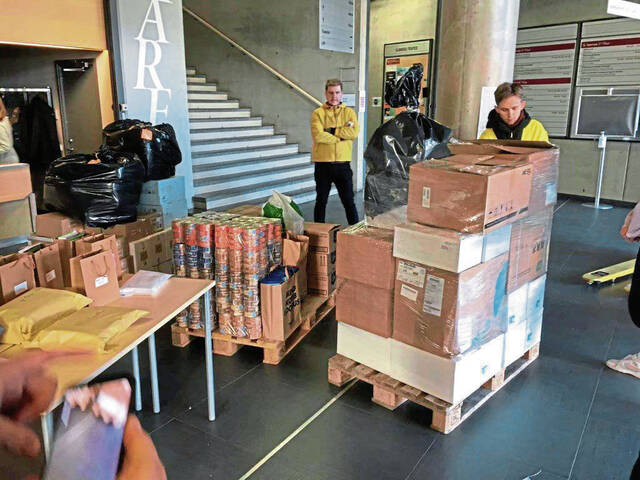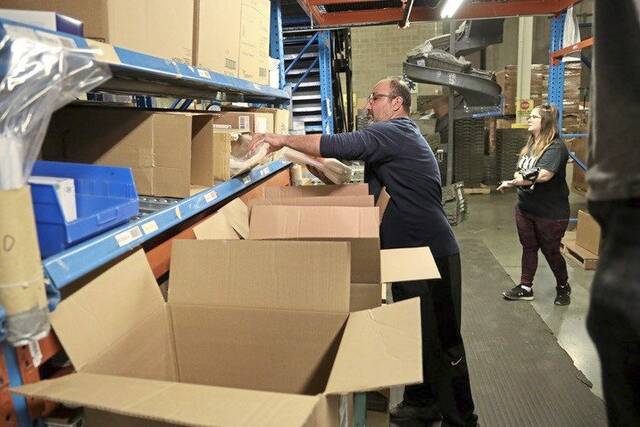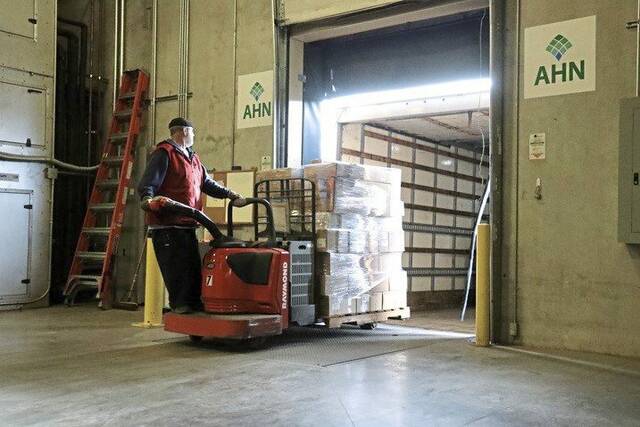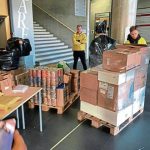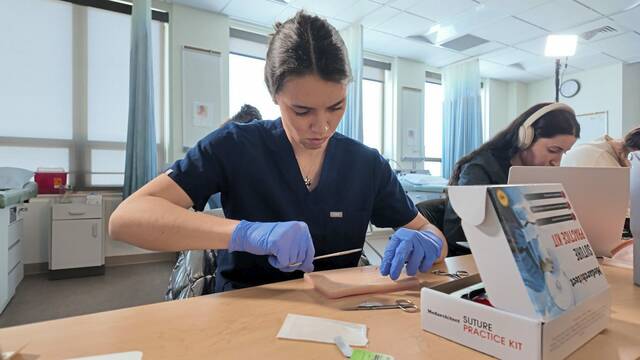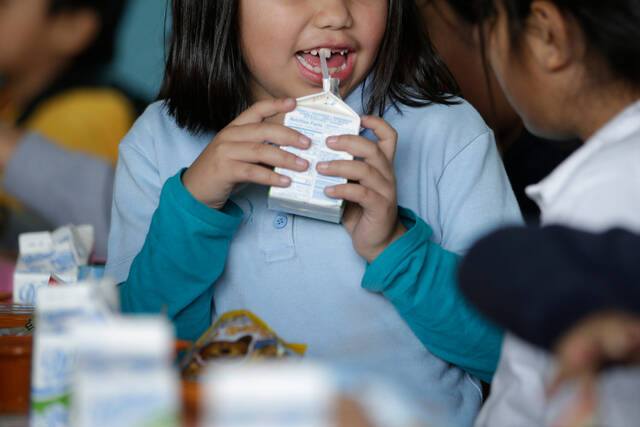Pittsburgh-area organizations have joined forces to help Ukrainians under siege of the ongoing Russian invasion by sending medical supplies and humanitarian aid to people in that war-torn eastern European country.
“It is amazing how giving the people of Western Pennsylvania have been. They have opened their hearts and wallets for Kentucky (tornado victims) and now in the Ukrainian crisis,” said Ozzy Samad, president of the nonprofit Brother’s Brother Foundation based on Pittsburgh’s North Side.
Brother’s Brother has partnered with the Pittsburgh Technology Council, Allegheny Health Network and Highmark Health in raising money and getting donations of medical supplies.
Brother’s Brother, which provides relief to those impacted by natural and man-made disasters on an international scale, had raised about $130,000 from more than 300 donors this week, Samad said. The amount of donations skyrocketed from the first 24 hours, when Brother’s Brother had raised about $20,000 from 150 donors, Samad said.
“We’d love to be able to raise a quarter of a million dollars. That’s meaningful,” said Audrey Russo, president of the Pittsburgh Technology Council, who said her organization contacted its members to support the efforts.
Allegheny Health Network has donated 50 pallets of medical supplies — gloves, syringes, intravenous solutions and medications to treat critical trauma patients, said Laura Mark, vice president of pharmacy for Allegheny Health.
The Jewish Federation of Greater Pittsburgh had received, as of Thursday, more than $400,000 for its Ukraine Relife Fund, plus another $500,000 going directly to JDC from a foundation with which the organization has had a longstanding relationship, spokesman Adam Hertzman said on March 15.
“There’s been an incredible outpouring,” he said.
The Jewish Agency for Israel and Joint Distribution Committee are helping both Ukrainian Jews and non-Jews, and the Jewish Agency is helping to resettle Jews in Israel if they want to emigrate, Hertzman said.
A large swath of the 200,000 Jews in Ukraine are elderly and low-income. About 1,500 are Holocaust survivors, Hertzman said.
“The level of trauma (for Holocaust victims) going through something like this again is inconceivable,” he said.
There are a large number of nonprofits operating in Ukraine, Hertzman said. Among those is Music in World Cultures, which has raised more than $30,000 for its relief efforts, said Kristy Kauffman, a spokeswoman for the Washington County-based organization that uses music as a strategic tool in missions.
Partnerships are a key for the organizations’ relief efforts, and joining with Brother’s Brother works well for the technology council because that organization has the experience to deliver medical supplies to those who need it, Russo said.
“The dollars go right out the door (in supply purchases), and what we buy will get into the right hands,” Russo said.
The technology council became involved when the Commerce Department’s U.S. Commercial Services Pittsburgh office issued a very urgent request for a list of supplies, said Brian Kennedy, senior vice president of operations for the technology council. The tech council spread the word to its more than 1,500 members, Kennedy said.
Knowing what to send to Ukraine became easier when the U.S. Embassy in Ankara, Turkey, provided organizations with a list of needed medical supplies, Samad said.
“We’re getting the supplies that are on the needs list. You can’t put a price on that,” Samad said.
Speaking of Allegheny Health’s donation, Samad said “there’s no way we would would have gotten this much supply” as quickly without Allegheny Health Network. Highmark Health has provided a cash donation that can be used to cover shipping costs, Samad said.
supplies will be flown to Bucharest, Romania, or Warsaw, Poland, early next week, then turned over to Ukrainian representatives who will transport it by truck to the border, Samad said.
The cost of shipping products in these inflationary times is yet another hurdle for providing the aid.
“The cost of sending four pallets is at $12,000. Then to get it to the border, might be another $3,000. The cost fluctuates daily, or by the hour,” Samad said.
Brother’s Brother also has supported mobile medical teams of three physicians and two nurses as well as those providing mental health assistance to the Ukrainians, Samad said.
Music ministry steps up
The money that Music in World Cultures anticipates for its relief-effort needs will reach more than $100,000 in the next several weeks “now that we see what the needs are on the ground,” Kauffman said. Thanks to the ability to move money to financial institutions across the world, Kauffman said, the organization is able to deposit money into an account in the United States and have it accessible to their Ukrainian partners almost immediately.
Music in World Cultures is working with its 20 employees in Ukraine to distribute food, water, clothing, medical supplies and hygiene items, Kauffman said.
Their employees buy the medical supplies, food, water and other items in Europe because it is cheaper than buying them in the United States and shipping them, Kauffman said. They are distributing that aid to frontline soldiers and to the women, children and others who are displaced, she said.
The MIWC music directors and orchestra conductors turned to distributing aid after transporting the team’s women and children out of the country, Kauffman said.
“They were very relieved to get their women and children out of Ukraine and to Romania,” she said.
The Ukrainian government provided special chaplain status to MIWC male workers, which allows them to travel throughout Ukraine and access closed areas to distribute aid. Without that designation, the workers would have to return to defend their hometowns, as ordered by the Ukrainian government, Kauffman said.
MIWC has three supply lines running within Ukraine and a team based in Estonia working in collaboration with the Estonian Evangelical Christian Baptist Union and the Student Volunteer Organization in Estonia.
“We partner with these organizations so as not to duplicate efforts but to meet as many needs as possible,” Kauffman said.
“The network we (MIWC) have developed in Ukraine and Eastern Europe over the last 25 years will now be used to meet the most immediate needs of suffering people,” said Stephen Benham, president of MIWC and a music education professor at Duquesne University.
The work is far from over, said Russo of the technology council.
“Everyone wants to do something,” she said.
Joe Napsha and Mary Ann Thomas are Tribune-Review staff writers. You can contact Joe at jnapsha@triblive.com and Mary Ann at mthomas@triblive.com.



